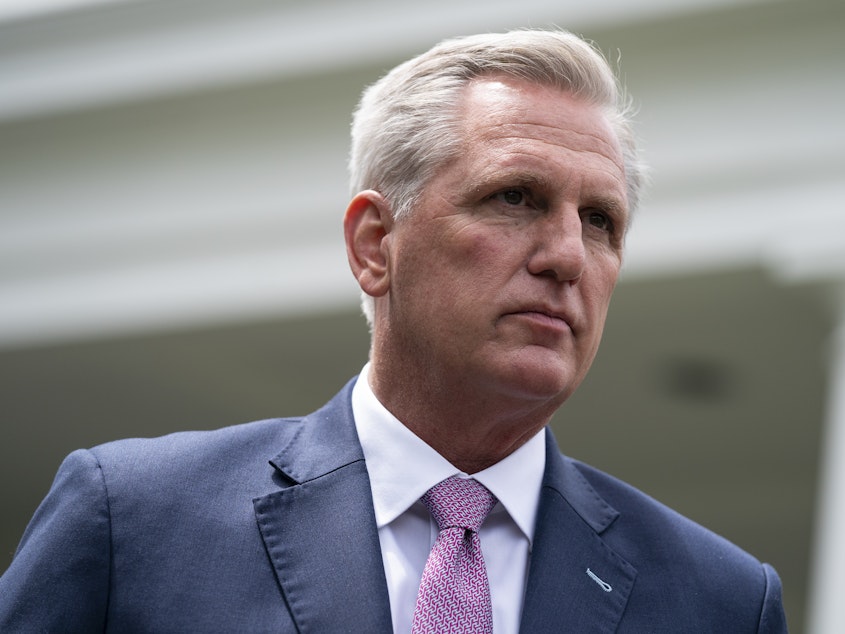Top House Republican Opposes Bipartisan Commission To Probe Capitol Riot

House Minority Leader Kevin McCarthy came out Tuesday against a bipartisan proposal to establish a 9/11-style commission to investigate the Jan. 6 attack on the U.S. Capitol. The announcement comes a day before the House is slated to vote on the legislation.
McCarthy tasked the top-ranking Republican on the Homeland Security Committee, New York GOP Rep. John Katko, to broker a deal on the commission and his opposition undercuts his own member's agreement with Chairman Bennie Thompson, D-Miss., and gives cover to other House GOP lawmakers to vote against it.
To explain his opposition, the California Republican pointed to other bipartisan efforts in the Senate to probe the riots, a security review underway by a top House official, and the Justice Department's arrests of hundreds who breached the Capitol that day. He said the fact that the commission isn't designed to also study other instances of political violence was a problem for him.
"Given the political misdirections that have marred this process, given the now duplicative and potentially counterproductive nature of this effort, and given the Speaker's shortsighted scope that does not examine interrelated forms of political violence in America, I cannot support this legislation," McCarthy said in a written statement Tuesday.
The bipartisan proposal calls for a 10-member panel, evenly split between the two parties: Five of them, including the chair, would be appointed by the House speaker and the Senate majority leader; the other five, including the vice chair, would be appointed by the minority leaders of the House and Senate. The commission is tasked with studying the "facts and circumstances of the January 6th attack on the Capitol as well as the influencing factors that may have provoked the attack on our democracy."
Sponsored
The commission would also have the power to issue subpoenas to carry out its investigation, but these would require "agreement between the Chair and the Vice Chair or a vote by a majority of Commission members."
The panel is directed to produce a final report and recommendations by Dec. 31. That timeline is much more expedited than the 9/11 commission, which took more than a year for Congress to create and which issued a report almost three years after the terror attacks.
The four-month effort to get agreement on the structure of a commission was stalled as GOP lawmakers pushed back on House Speaker Nancy Pelosi's initial plan that included more Democrats than Republicans. They also wanted a broader focus.
Wyoming GOP Rep. Liz Cheney, who was ousted last week from her No. 3 House GOP leadership post for her criticism of former President Donald Trump, told ABC News she wouldn't be surprised if McCarthy were subpoenaed by a commission.
McCarthy spoke with Trump on Jan. 6 and has talked publicly about his appeals to the president that day to address those rioting at the Capitol and urge them to leave. During the second impeachment trial of Trump earlier this year, Rep. Jaime Herrera Beutler, R-Wash., revealed that McCarthy told her the president's response to him was, " 'Well, Kevin, I guess these people are more upset about the election than you are.' "
Sponsored
"I would hope he doesn't require a subpoena, but I wouldn't be surprised if he were subpoenaed," Cheney said about McCarthy.
In recent weeks some Republican lawmakers have downplayed the threat to the Capitol on Jan. 6 despite the fact that many of them were in the building when hundreds of violent protesters clashed with police. And while many on the right have tried to emphasize the threat of antifa, the nation's top law enforcement officials and the rioters themselves confirm that right-wing extremists hold responsibility for the violence.
McCarthy, who days after the attack said Trump deserved blame for the riots, has softened his stance. Last week after he met with President Biden, he maintained that no one is disputing the 2020 election results — hours after backing an effort to remove Cheney for calling out fellow Republicans who continue to raise questions about the certification in some states.
Pelosi, asked about McCarthy's opposition, told reporters on Capitol Hill, "I'm very pleased that we have a bipartisan bill to come to the floor and it's disappointing, but not surprising, that the cowardice on the part of some on the Republican side not to want to find the truth."
Senate Minority Leader Mitch McConnell, R-Ky., has not weighed in on the proposal yet. The measure is expected to be approved by the House but would need 10 GOP senators to back it to get through the upper chamber.
Sponsored
NPR Congressional reporter Claudia Grisales contributed to this report. [Copyright 2021 NPR]



